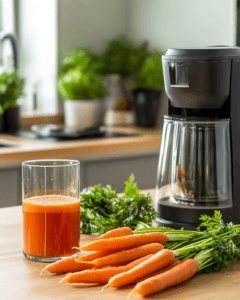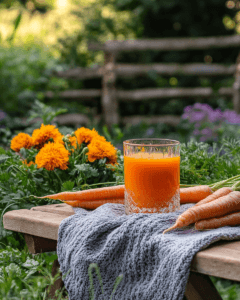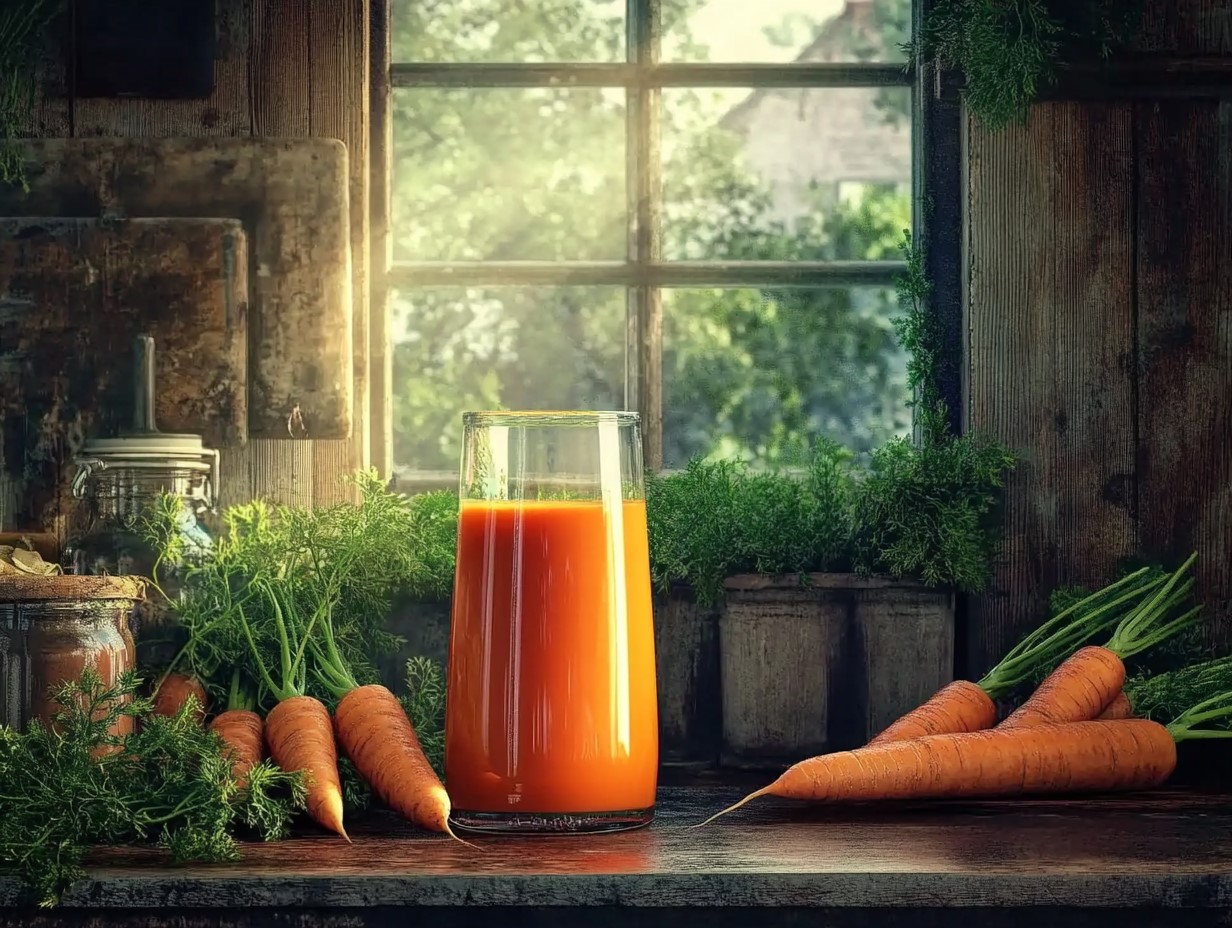Carrot juice is a popular beverage celebrated for its nutritional benefits and refreshing taste. With its vibrant orange color and natural sweetness, this drink is a staple for health enthusiasts and a go-to option for those seeking a quick dose of essential nutrients. But with its growing popularity comes an important question: Is it OK to drink carrot juice every day?
In this article, we’ll explore the benefits and potential risks of consuming carrot juice daily, helping you determine whether it’s a healthy habit or if moderation is necessary. From its rich nutritional profile to tips on incorporating it into your diet, this comprehensive guide will shed light on everything you need to know.
What Makes Carrot Juice Healthy?
Nutritional Profile of Carrot Juice
Carrot juice is a nutrient powerhouse, making it an excellent addition to a balanced diet. This orange beverage is packed with essential vitamins, minerals, and antioxidants that work together to support overall health. Below is a closer look at the primary nutrients found in carrot juice:
- Beta-Carotene and Vitamin A: Carrot juice is an exceptional source of beta-carotene, a natural pigment that the body converts into vitamin A. Vitamin A is crucial for healthy vision, skin repair, and immune function.
- Vitamin K: This vitamin supports bone health and aids blood clotting, making it vital for overall well-being.
- Potassium: Carrot juice provides a good amount of potassium, which helps regulate blood pressure and promotes heart health.
- Vitamin C: As an antioxidant, vitamin C boosts the immune system, repairs tissues, and fights free radicals that cause cell damage.
- Fiber (in freshly blended juice): Carrots naturally contain dietary fiber, which supports digestion and gut health, though much of it is removed during juicing.
In addition to these, carrot juice contains trace amounts of B vitamins, magnesium, and calcium, all of which contribute to energy production and strong bones. A standard 8-ounce (240 ml) glass of carrot juice contains roughly 80-100 calories, making it a low-calorie drink packed with nutrition.
Benefits of Drinking Carrot Juice
Carrot juice is more than just a thirst-quencher; its nutrient-dense profile delivers several health benefits when consumed regularly. Here’s how carrot juice can positively impact your health:
1. Promotes Eye Health
Carrot juice is famous for improving and protecting eyesight, thanks to its high beta-carotene content. Beta-carotene is converted into vitamin A, a nutrient essential for maintaining the health of your eyes. Vitamin A prevents night blindness and protects against age-related eye disorders, such as macular degeneration.
Additionally, carrots contain lutein and zeaxanthin, antioxidants that shield the eyes from harmful blue light and oxidative stress. For individuals working long hours on screens, incorporating carrot juice into their diet can provide significant relief and protection.
2. Supports Healthy Skin
The antioxidants in carrot juice, particularly beta-carotene and vitamin C, help keep your skin glowing and youthful. Beta-carotene is known to repair damaged skin tissues, reduce inflammation, and protect against UV-induced damage. Vitamin C further aids collagen production, which maintains skin elasticity and prevents wrinkles.
Regular consumption of carrot juice can reduce acne, fade scars, and add a natural glow to your skin, making it a popular beauty drink. However, excessive consumption can lead to carotenemia, a condition we’ll discuss in later sections.
3. Strengthens the Immune System
Carrot juice is an immunity-boosting beverage, thanks to its impressive nutrient profile. Vitamins A and C are powerful antioxidants that protect the body’s cells from oxidative stress while strengthening the immune response. Beta-carotene enhances white blood cell production, which helps the body fight infections more efficiently.
Furthermore, the drink contains small amounts of iron and folate, both of which support healthy blood production and overall immunity.
4. Aids in Digestion
Fresh carrot juice can promote better digestion when consumed in moderation. Although juicing removes most of the fiber content, carrot juice still provides enzymes and nutrients that support gut health. It can relieve mild constipation, stimulate bile secretion, and improve the overall absorption of nutrients in the digestive system.
For better digestive results, blending whole carrots (rather than juicing) will retain the fiber content, which improves bowel movements and keeps you feeling full longer.
5. Supports Heart Health
Carrot juice plays a role in maintaining a healthy heart due to its potassium content, which helps regulate blood pressure. High potassium levels prevent hypertension by counteracting the effects of sodium. Additionally, antioxidants like beta-carotene and vitamin C reduce inflammation and oxidative stress, protecting the heart from long-term damage.
Studies also suggest that regular consumption of carrot juice can lower LDL cholesterol (bad cholesterol), further reducing the risk of cardiovascular diseases. For individuals managing their heart health, carrot juice can serve as a nutritious alternative to sugary beverages.
6. Boosts Energy Levels
Carrot juice is an excellent natural energy booster. Its combination of natural sugars and B vitamins provides a steady release of energy, helping you stay active and refreshed throughout the day. It’s particularly beneficial as a pre-workout drink, offering quick energy without the crash associated with caffeinated drinks or sugary sodas.

How Much Carrot Juice Should You Drink Per Day?
While carrot juice is undeniably nutritious, moderation remains key to enjoying its benefits without risking overconsumption. Experts recommend a safe and balanced daily intake to make the most of carrot juice while maintaining a healthy lifestyle. Here’s a detailed guide on how much carrot juice is ideal and tips for incorporating it into your diet effectively.
Recommended Daily Intake of Carrot Juice
Health experts generally suggest drinking one glass of carrot juice per day—approximately 8 ounces (240 ml). This amount allows you to reap the benefits of beta-carotene, vitamin A, potassium, and antioxidants without overwhelming your system.
Why Stick to One Glass Per Day?
- Avoid Vitamin A Toxicity: Carrot juice’s high beta-carotene content is great for health, but excessive intake can lead to hypervitaminosis A and carotenemia, as discussed earlier.
- Manage Sugar Intake: Carrot juice naturally contains around 9 grams of sugar per glass. Limiting consumption helps prevent blood sugar spikes, particularly for individuals managing diabetes or weight.
- Balance Nutrients: Consuming other fruits and vegetables ensures a balanced intake of nutrients and prevents reliance on one food source for health benefits.
By sticking to one glass daily, you can comfortably enjoy carrot juice as part of a healthy routine without overloading on nutrients or sugar.
The Best Time to Drink Carrot Juice
The time you consume carrot juice can impact its health benefits. Here are the most effective times to drink it:
- In the Morning on an Empty Stomach: Drinking carrot juice first thing in the morning allows your body to absorb the nutrients more efficiently. It provides a natural energy boost, aids digestion, and hydrates the body after a long night’s rest.
- As a Midday Refreshment: A glass of carrot juice in the afternoon can help fight fatigue, keeping you energized throughout the day without the crash that comes from sugary drinks or caffeine.
- Post-Workout Recovery: Carrot juice serves as a natural post-workout drink due to its ability to replenish electrolytes, reduce inflammation, and support muscle recovery.
Tip: Avoid drinking carrot juice late at night, as its natural sugars may cause a slight energy spike, which could interfere with sleep quality.
Incorporating Carrot Juice into a Balanced Diet
To enjoy carrot juice safely, integrate it into a well-rounded diet rather than relying on it as your primary source of nutrients. Here are some tips:
1. Pair Carrot Juice with Other Nutrient-Rich Foods
Combine carrot juice with foods that are high in protein, fiber, or healthy fats to balance out its sugar content and support steady energy levels. For example:
- A glass of carrot juice with a handful of almonds or walnuts provides healthy fats and protein.
- Pair carrot juice with a boiled egg or Greek yogurt for a nutrient-dense breakfast or snack.
2. Mix Carrot Juice with Other Vegetables
To lower the sugar content and boost nutrient variety, combine carrot juice with other vegetables like celery, spinach, or cucumber. This not only enhances the nutritional value but also adds different flavors.
Example:
- Carrot-Celery Juice: A refreshing drink with lower sugar and extra hydration.
- Carrot-Spinach Blend: Adds iron, vitamin K, and antioxidants to your juice.
3. Opt for Freshly Made Carrot Juice
Whenever possible, make carrot juice at home using fresh, organic carrots. Store-bought juices may contain added sugars, preservatives, or pasteurization processes that reduce their nutritional value.
Benefits of Fresh Juice:
- Retains more vitamins, enzymes, and antioxidants.
- Contains no artificial additives or excessive sugar.
If you must choose store-bought carrot juice, look for labels that state 100% pure juice with no added sugars or preservatives.
4. Rotate Carrot Juice with Other Health Drinks
To avoid overconsumption of beta-carotene or vitamin A, consider rotating carrot juice with other healthy beverages. This ensures you get a diverse range of nutrients without relying on one specific drink.
Healthy Alternatives to Carrot Juice:
- Green Juice: A blend of kale, spinach, and cucumber for iron and chlorophyll.
- Beetroot Juice: A heart-healthy drink rich in nitrates and antioxidants.
- Tomato Juice: Packed with lycopene for skin protection and heart health.
Rotating drinks also keeps your diet interesting and prevents taste fatigue.
Signs You’re Drinking Too Much Carrot Juice
If you’re unsure whether you’re overconsuming carrot juice, watch for the following signs:
- Skin Discoloration (Carotenemia): Yellow or orange tint on the palms, soles, or face.
- Digestive Issues: Bloating, gas, or loose stools caused by excess sugar intake.
- Headaches or Dizziness: Symptoms of excess vitamin A consumption.
If you notice any of these signs, reduce your intake immediately and consult a healthcare provider for guidance.
Comparing Carrot Juice with Other Health Drinks
Carrot juice is not the only healthy beverage available. Here’s how it stacks up against other popular drinks:
- Carrot Juice vs. Green Juice:
- Carrot Juice: Higher in beta-carotene and vitamin A.
- Green Juice: Rich in chlorophyll, iron, and vitamin K, with lower natural sugars.
- Carrot Juice vs. Fruit Smoothies:
- Carrot Juice: Lower in calories and sugar than most fruit smoothies.
- Fruit Smoothies: Contain fiber and a variety of vitamins but may spike blood sugar due to higher fruit content.
Conclusion: Carrot juice is a balanced option for those seeking a low-calorie, nutrient-dense drink. Combining it with green juice or smoothies occasionally ensures a diverse nutrient intake.

FAQs About Drinking Carrot Juice Every Day
1. Can I drink carrot juice on an empty stomach?
Yes, drinking carrot juice on an empty stomach can be highly beneficial. It allows your body to absorb nutrients more effectively, providing a quick energy boost and promoting digestion. However, individuals with sensitive stomachs should combine it with a small snack like nuts or yogurt to avoid potential discomfort.
2. Does carrot juice improve hair health?
Yes, carrot juice can contribute to healthier hair. It contains vitamin A, which promotes the production of sebum (natural oil) that keeps the scalp hydrated. Additionally, antioxidants and vitamins like C and E support hair strength, prevent breakage, and may even aid in reducing hair loss over time.
3. What is homemade carrot juice good for?
Homemade carrot juice is excellent for:
- Boosting eye health: Due to its high beta-carotene and vitamin A content.
- Improving skin glow: Antioxidants and hydration nourish the skin.
- Strengthening the immune system: Vitamins C and A support overall immunity.
- Aiding digestion: It hydrates and provides natural enzymes for better gut health.
Homemade juice is also free of additives, making it fresher, healthier, and more nutrient-dense compared to store-bought options.
4. What fruits pair with carrots?
Carrots pair well with a variety of fruits to create delicious and nutritious juice blends. Some popular options include:
- Apples: Adds sweetness and enhances flavor.
- Oranges: Boosts vitamin C and adds a tangy taste.
- Pineapple: Provides tropical flavor and additional enzymes for digestion.
- Mangoes: Adds creamy texture and natural sweetness.
These combinations improve both the flavor profile and nutritional value of carrot juice.
5. Do you need to peel carrots before juicing?
Peeling carrots before juicing is not necessary if they are thoroughly washed. The skin contains nutrients and fiber, but for organic carrots, washing them well is enough. However, peeling is recommended for non-organic carrots to remove pesticide residues.

Conclusion
Drinking carrot juice every day can offer numerous health benefits, from improving vision and skin health to boosting immunity and supporting heart health. Its rich supply of vitamins, minerals, and antioxidants makes it an excellent addition to any balanced diet.
However, moderation is essential. Overconsumption may lead to risks like vitamin A toxicity, carotenemia, or sugar-related issues. By sticking to the recommended daily intake of one glass (8 ounces), you can enjoy carrot juice safely and reap its full benefits.
To maximize its potential, consider enhancing carrot juice with healthy additives like ginger, turmeric, or greens and always opt for fresh, homemade juice whenever possible. Incorporating it into a varied diet alongside other health drinks ensures a well-rounded nutrient intake.
In summary, carrot juice can indeed be a part of your daily routine, provided you consume it mindfully. Cheers to a healthier you, one glass of carrot juice at a time!
For inspiration on creating balanced meals to pair with your drinks, explore the Ultimate Guide to Perfect Potato Tacos for a nutritious and delicious option.
If you’re exploring more ways to enhance your diet, you may find it helpful to learn What Goes with Sausage for Dinner to build balanced and delicious meal combinations.

